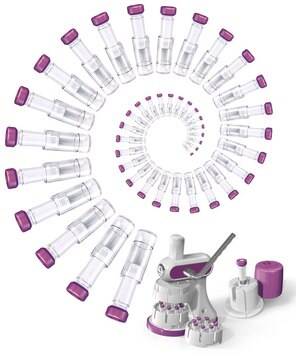MAB1430
Anti-Collagen Type IV Antibody, clone 24.12.8 (PHM-12)
clone 24.12.8 (PHM-12), Chemicon®, from mouse
Zaloguj sięWyświetlanie cen organizacyjnych i kontraktowych
About This Item
Kod UNSPSC:
12352203
eCl@ss:
32160702
NACRES:
NA.41
Polecane produkty
pochodzenie biologiczne
mouse
Poziom jakości
forma przeciwciała
purified immunoglobulin
klon
24.12.8 (PHM-12), monoclonal
reaktywność gatunkowa
human
producent / nazwa handlowa
Chemicon®
metody
immunohistochemistry (formalin-fixed, paraffin-embedded sections): suitable
izotyp
IgG1
numer dostępu UniProt
Warunki transportu
wet ice
docelowa modyfikacja potranslacyjna
unmodified
Opis ogólny
BIOCHEMISTRY:
p I = 5.5
p I = 5.5
Specyficzność
MAB1430 provides a marker for an antigen known to be important in glomerular cell-matrix interactions, and should prove useful in research into the mechanisms involved in renal pathology. This antibody reacts with glomerular and tubular basement membranes in kidney as well as basal lamina of capillaries. It also labels mesangial cells and matrix within the glomerulus as well as basement membrane structures in all organs examined (Gusterson et al., 1984).
Immunogen
Human glomeruli
Zastosowanie
Detect Collagen Type IV using this Anti-Collagen Type IV Antibody, clone 24.12.8 (PHM-12) validated for use in IH, IH(P).
The antibody is suitable for use on both frozen and protease digested paraffin processed tissue.
SUGGESTED USAGE
Indirect immunoperoxidase staining - the final dilution will depend on the assay conditions and detection system employed. However, a dilution of at least 1:40 will be applicable to most commonly used systems.
Optimal working dilutions must be determined by the end user.
SUGGESTED USAGE
Indirect immunoperoxidase staining - the final dilution will depend on the assay conditions and detection system employed. However, a dilution of at least 1:40 will be applicable to most commonly used systems.
Optimal working dilutions must be determined by the end user.
Postać fizyczna
Format: Purified
Purified immunoglobulin presented as a liquid in phosphate buffered saline, pH 7.4, containing 0.2% bovine serum albumin and 0.1% sodium azide.
Przechowywanie i stabilność
Store at 2 to 8°C, for up to 6 months. For prolonged periods, store below -20°C in undiluted aliquots. AVOID REPEATED FREEZE/THAW CYCLES.
WARNING: The monoclonal reagent solution contains 0.1% sodium azide as a preservative. Due to potential hazards arising from the build up of this material in pipes, spent reagent should be disposed of with liberal volumes of water.
WARNING: The monoclonal reagent solution contains 0.1% sodium azide as a preservative. Due to potential hazards arising from the build up of this material in pipes, spent reagent should be disposed of with liberal volumes of water.
Inne uwagi
Concentration: Please refer to the Certificate of Analysis for the lot-specific concentration.
Informacje prawne
CHEMICON is a registered trademark of Merck KGaA, Darmstadt, Germany
Ta strona może zawierać tekst przetłumaczony maszynowo.
Kod klasy składowania
12 - Non Combustible Liquids
Klasa zagrożenia wodnego (WGK)
WGK 2
Temperatura zapłonu (°F)
Not applicable
Temperatura zapłonu (°C)
Not applicable
Certyfikaty analizy (CoA)
Poszukaj Certyfikaty analizy (CoA), wpisując numer partii/serii produktów. Numery serii i partii można znaleźć na etykiecie produktu po słowach „seria” lub „partia”.
Masz już ten produkt?
Dokumenty związane z niedawno zakupionymi produktami zostały zamieszczone w Bibliotece dokumentów.
Diffusible factors released by fibroblasts support epidermal morphogenesis and deposition of basement membrane components.
El Ghalbzouri, Abdoelwaheb and Ponec, Maria
Wound Repair and Regeneration, 12, 359-367 (2004)
Inflammation, immune reactivity, and angiogenesis in a severe combined immunodeficiency model of rheumatoid arthritis.
Davis, LS; Sackler, M; Brezinschek, RI; Lightfoot, E; Bailey, JL; Oppenheimer-Marks, N; Lipsky, PE
The American Journal of Pathology null
Invading squamous cell carcinoma can retain a basal lamina. An immunohistochemical study using a monoclonal antibody to type IV collagen.
Gusterson, B A, et al.
Laboratory Investigation; a Journal of Technical Methods and Pathology, 51, 82-87 (1984)
Production of monoclonal antibodies to fibronectin, type IV collagen and other antigens of the human glomerulus.
Hancock, W W, et al.
Pathology, 16, 197-206 (1984)
S E Aggrey et al.
Poultry science, 73(12), 1822-1828 (1994-12-01)
Records of 1,530 Japanese quail were used to estimate heritabilities and genetic correlations based on a derivative-free restricted maximum likelihood (REML) method with an animal model and ANOVA. The animal model included fixed effects of hatch and sex, random effects
Nasz zespół naukowców ma doświadczenie we wszystkich obszarach badań, w tym w naukach przyrodniczych, materiałoznawstwie, syntezie chemicznej, chromatografii, analityce i wielu innych dziedzinach.
Skontaktuj się z zespołem ds. pomocy technicznej